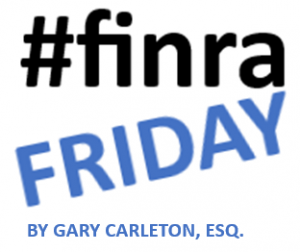

Welcome to #finraFridays!
This Blog breaks down the mysteries of FINRA’s investigative and disciplinary process so that those of you who are facing scrutiny by the regulator are better prepared to defend yourself. In each posting, we explore a small piece of the process and explain how it impacts FINRA and you. If you want a topic covered on #finraFridays, feel free to contact Gary Carleton at gary@carletonlaw.net.
This Week:
Keeping Stockbrokers Out of Trouble
by Updating Their FINRA Form U4 Filings
You would think that FINRA Enforcement spends the vast majority of its time investigating and prosecuting bad guys – those brokers who steal from customers, manipulate the stock market, churn customer accounts, and the like. And yes, while they do spend time on that, it also expends a lot of effort going after brokers who simply failed to update their online registration forms (a “Form U4”) to keep the information on them current.
I have been engaged in FINRA’s investigations, disciplinary hearings, and appellate processes for more than 30 years, from the inside as a Senior Counsel in FINRA’s Enforcement Department, as a FINRA Hearing Officer, and now as a defense counsel. At FINRA I was obligated to deal with many of these Form U4 cases. Now as defense counsel, I make every effort to have brokers avoid these needless errors that are often quite costly.
Every year, FINRA fines, suspends, and even bars brokers who fail to update their Form U4s on a timely basis to reflect that they were the subject of a lien, bankruptcy, financial judgment, criminal charge or conviction or investment-related regulatory investigation or disciplinary action.
A review of FINRA’s published Monthly Disciplinary Actions so far for 2022 listed 14 brokers or firms that had been disciplined for failing to timely update a Form U4. (See https://www.finra.org/rules-guidance/oversight-enforcement/disciplinary-actions). That does not account for ongoing investigations or numerous other investigations conducted by FINRA staff that did not result in formal disciplinary action and are not reportable. Of course, those nonreportable investigations nonetheless tie up firm and broker resources addressing these issues raised by FINRA.
These disclosures that are required to be made do serve an important purpose to both regulators and the investing public. One of the main justifications for requiring timely amendments to broker registrations is that the investing public should access to the most accurate information about a broker before deciding whether to rely on that broker to help invest a customer’s hard-earned funds.
Also, FINRA firms and registered investment advisory firms that are considering hiring an individual will often review of the broker’s registration disclosures in making a hiring decision.
The information is available to those in regulatory agencies and FINRA firms through FINRA’s Central Registration Depository. A significant amount but not all of the information is also available to the investing public through FINRA’s Brokercheck. (See https://brokercheck.finra.org/).
I used Brokercheck myself before retaining a broker to invest my own funds. It is practically reckless not to check a broker’s background through Brokercheck before trusting them with your money.
Unfortunately, brokers end up shooting themselves in the foot simply by failing to file the necessary amendments. So, when must a broker or firm amend a Form U4? According to FINRA’s website:
Registered individuals are under a continuing obligation to update changes to information required by Form U4 within a specified amount of time by filing an appropriate amendment, as prescribed in Article V, Section 2 of the FINRA By-Laws.
The filing firm is obligated to retain and make available for inspection upon regulatory request a copy of the initial Form U4 and amendments to Disclosure Reporting Pages as stated in FINRA Rule 1010 and the instructions to the Form U4. (https://www.finra.org/registration-exams-ce/broker-dealers/registration-forms/form-u4#u4-include)
According to Article V, Section 2(c) of the By-Laws:
Every application for registration filed with the Corporation shall be kept current at all times by supplementary amendments via electronic process or such other process as the Corporation may prescribe to the original application. Such amendment to the application shall be filed with the Corporation not later than 30 days after learning of the facts or circumstances giving rise to the amendment. If such amendment involves a statutory disqualification as defined in Section 3(a)(39) and Section 15(b)(4) of the Act, such amendment shall be filed not later than ten days after such disqualification occurs. (Emphasis added)
Most of the cases brought by FINRA for failing to timely update a broker’s Form U4 occur in responding to Questions 13 or 14 of the form. It is very important that brokers take the time to familiarize themselves with the information required to be disclosed in response to those questions. (Review Form U4 at https://www.finra.org/sites/default/files/form-u4.pdf).
Broadly speaking, those categories of information include:
Question #13:
Whether the broker is currently engaged in any other business either as a proprietor, partner, officer, director, employee, trustee, agent or otherwise.
Question #14:
This question generally and broadly covers whether a broker has been charged or convicted of any criminal felony, or a misdemeanor that is associated with investments, an investment-related business or any fraud, false statements or omissions, wrongful taking of property, bribery, perjury, forgery, counterfeiting, extortion, or a conspiracy to commit any of these offenses.
Also, if the broker has been the subject of any investigations or findings by the SEC, CFTC, FINRA, a banking agency, an insurance agency, credit union, investment-related arbitration, or the like, it is critical that the broker carefully review their reporting obligations for Form U4.
Finally, another category that often results in disciplinary action involve bankruptcy and unsatisfied judgments or liens.
Conclusion
It is incumbent on every broker to be aware of the updating requirements for Form U4 and ensure that the amendments are made on a timely basis. Failing to know their obligation and follow through is an “unforced error” and is likely to catch up to the broker and cause what could be catastrophic damage to their career as a broker. There is no excuse of “I forgot” since this is a not a violation that requires the showing of any intent not to file.
Be smart and don’t give FINRA the opportunity to discipline you for failing to make this necessary filing.
______________________________________________________________________________
Gary Carleton focuses his practice representing individuals and firms facing arbitrations, FINRA and SEC investigations, disciplinary proceedings, and appeals. He also serves as co-counsel with attorneys who have clients facing FINRA or SEC investigations or disciplinary proceedings Read more about Gary’s background at https://carletonlaw.net/about-us/. Contact Gary Carleton at 202.744.6297 or gary@carletonlaw.net to set up an initial consultation.
In Case You Missed It – You can find prior blogs on the FINRA investigative and disciplinary process at www.carletonlaw.net and go to the Blog tab. #finraFlashback blogs in which we discuss notorious FINRA disciplinary proceedings can also be found at www.carletonlaw.net.
The prior topics include:
* Why FINRA’s Disciplinary Decisions are so “Appealing”
https://carletonlaw.net/why-finras-disciplinary-decisions-are-so-appealing/
* FINRA Flashback – FINRA’s Investigation Uncovers Stock Manipulation
https://carletonlaw.net/finra-flashback-finras-investigation-uncovers-stock-manipulation/
* FINRA Flashback to Stratton Oakmont
https://carletonlaw.net/finra-flashback-to-stratton-oakmont/
* Where have all the FINRA Members (and disciplinary actions) gone?
https://carletonlaw.net/where-have-all-the-finra-members-and-disciplinary-actions-gone/
* Special Considerations for Small Firms when Negotiating Settlements with FINRA
https://carletonlaw.net/special-considerations-for-small-firms-when-negotiating-settlements-with-finra/
* Receiving that First Request for Information (a Rule 8210 Request)
https://carletonlaw.net/receiving-that-first-request-for-information-a-rule-8210-request/
* Pre-Wells Notices – An Early Opportunity to Discover FINRA’s Evidence and Present Your Case
https://carletonlaw.net/pre-wells-notices-an-early-opportunity-to-discover-finras-evidence-and-present-your-case/
* Understanding the Significance of FINRA’s Limited Jurisdiction;
https://carletonlaw.net/315-2/ and
* How Old is Too Old for a FINRA Disciplinary Action
https://carletonlaw.net/how-old-is-too-old-for-a-finra-disciplinary-action/
About Carleton Law PLLC
Getting a call from FINRA or SEC Enforcement telling you that your work as a securities broker is under investigation could be the worst day of your life. You have worked hard for years building your business. Now, with one wrongful allegation you can see it all swept away. But with expert counsel, it does not have to end that way.
For more than 30 years, Gary Carleton was the attorney conducting those investigations at FINRA and SEC and now his firm, Carleton Law PLLC, brings that savvy experience to bear to advocate for brokers and FINRA firms who find themselves in that dreaded position. Carleton Law focuses on the individual needs of each client to guide them through the maze of the arbitration, investigative, and disciplinary process.
Carleton Law PLLC | 2001 Massachusetts Avenue NW, Washington, DC 20036 | info@carletonlaw.net | 202.744.6297
The information provided in this article does not, and is not intended to, constitute legal advice; instead, all information is for general informational purposes only. Readers of this article should contact their attorney to obtain advice with respect to any particular legal matter. No reader should act or refrain from acting on the basis of information contained herein without first seeking legal advice from counsel in the relevant jurisdiction. Only your individual attorney can provide assurances that the information contained herein – and your interpretation of it – is applicable or appropriate to your particular situation. Use of, and access to, this article does not create an attorney-client relationship between the reader or user and the article author or law firm.
Attorney Advertising – Gary Carleton, Principal of Carleton Law, is admitted to practice law in the State of New York and the District of Columbia. This article may be considered attorney advertising.
